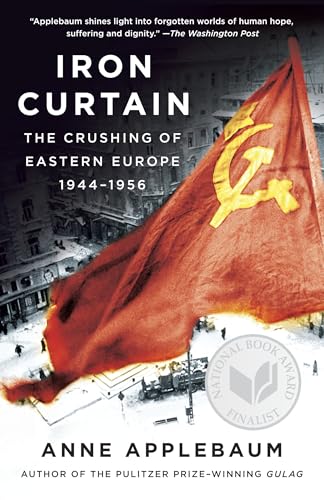Iron Curtain
The Crushing of Eastern Europe, 1944-1956
Anne Applebaum
BOOK REVIEW

The Iron Curtain: The Crushing of Eastern Europe, 1944-1956, written by the brilliant Anne Applebaum, is not just a historical account; it's an unbearably intense journey through the chilling aftermath of World War II and the grim realities experienced by nations caught in the vice of Soviet control. This isn't merely a book; it's a vivid testament to the human condition amidst oppression, plunging you into a world where despair and resilience dance an unsettling waltz.
Applebaum, a Pulitzer Prize-winning journalist, delves deep into the dark narrative of Eastern Europe, providing a gripping exploration of how totalitarian regimes effectively dismantled societies, economies, and spirits. She doesn't shy away from the horrific atrocities that marked this period; instead, she confronts them head-on, igniting a torrent of emotions within the reader. You might find yourself feeling outrage and heartbreak as you absorb the devastating realities faced by millions, highlighting the sinister machinery of the state that crushed dissent and freedom.
The book strains your empathy, forcing you to grapple with the concept of innocence lost. The stories of brave individuals-those who found ways to resist, to speak out against tyranny, or simply to survive-intertwine in a tapestry of courage and despair. It's a narrative that screams to be heard, a cosmic reminder of how fragile liberty can be when enveloped by darkness. Applebaum's meticulous research transports you into secret police operations, the gut-wrenching loss of individual liberties, and the relentless propaganda that warped the very fabric of everyday life.
Readers have passionately debated and dissected Applebaum's portrayal of Eastern European countries during this bleak epoch. Some praise her for bringing vividly to life an era often sanitized in mainstream narratives. Others argue that her focus on the Soviet model inherently diminishes the complexity of individual nation-states' experiences. Nonetheless, whether you feel exalted by her insights or challenged by her conclusions, one thing is certain: Applebaum's account absorbs you, compelling you to confront uncomfortable truths about power, survival, and the enduring human spirit.
Let's not forget the broader implications of this work today. In an age where authoritarianism rears its ugly head anew in various corners of the globe, Applebaum's Iron Curtain is a stark warning, an alarming beacon that demands reflection. It pushes you to consider the cost of complacency, asking whether history might be poised to repeat its darkest chapters.
What echoes throughout the pages of this weighty tome is the notion that we cannot afford to forget. The resilient voices of those who endured-who dared to dream of freedom amid oppression-serve as a haunting reminder that the struggle for human rights is ceaseless and fraught with peril. By immersing yourself in Iron Curtain, you don't just digest history; you become part of the ongoing conversation about liberty and dignity in our world.
So, as you stand on the precipice of choosing your next read, remember that Applebaum's work isn't merely an academic endeavor. It's a call to awaken your consciousness, a relentless push to engage with the world around you. Don't just read this book; let it transform you, leaving an indelible mark on your consciousness that reverberates long after the final page is turned. The past lingers in our choices, and Applebaum's narrative lays bare the consequences of ignoring its lessons.
📖 Iron Curtain: The Crushing of Eastern Europe, 1944-1956
✍ by Anne Applebaum
🧾 634 pages
2013
#iron #curtain #crushing #eastern #europe #1944 #1956 #anne #applebaum #AnneApplebaum